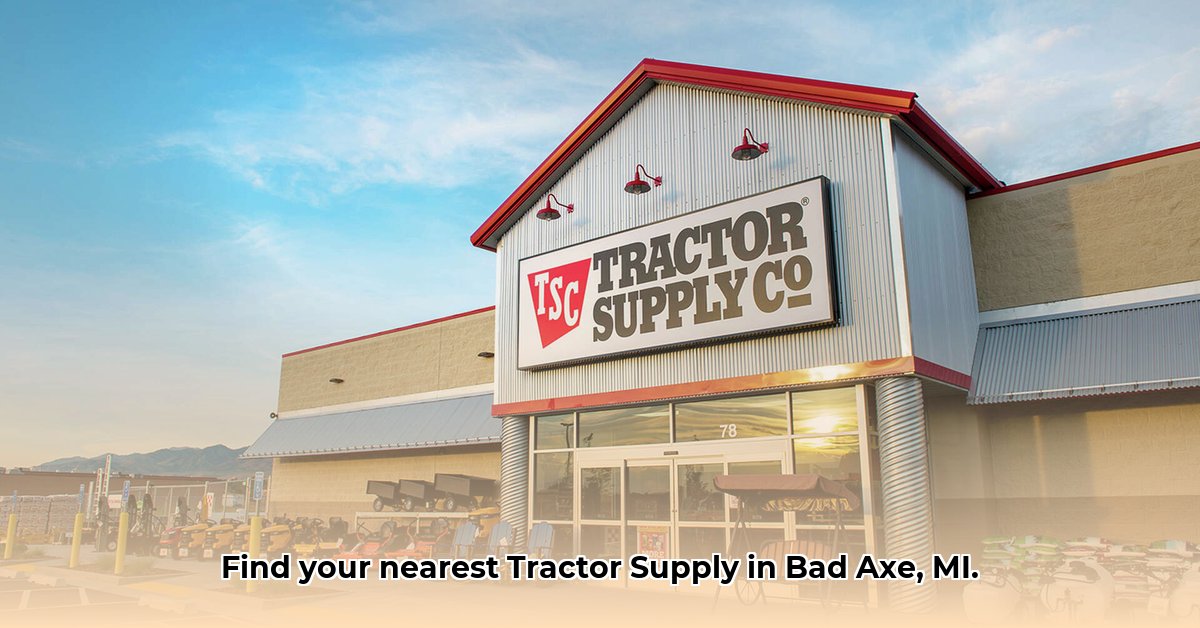
Locating Your Nearest Tractor Supply in Bad Axe, Michigan
Finding the Tractor Supply store in Bad Axe, Michigan is straightforward. A quick online search will provide the address, phone number, and operating hours. Their website offers additional information, including current sales and in-stock inventory. Checking online before visiting allows farmers to plan their trips efficiently, saving both time and fuel costs. The store likely offers a range of products and services tailored to the agricultural needs of the Thumb region of Michigan. For Upper Peninsula options, check out this Ironwood location.
Regional Access: Agricultural Supply Distribution in Michigan
Michigan's agricultural landscape presents a significant challenge regarding access to farm supplies. While Tractor Supply and similar retailers have a presence across the state, the distribution is uneven. Southern Michigan boasts a higher concentration of stores compared to the sparsely populated Upper Peninsula and northern regions. This disparity creates substantial difficulties for farmers in remote areas.
How does this uneven distribution affect farmers in remote areas? Consider a farmer in the Upper Peninsula needing a vital equipment part. Additional travel time and fuel costs to reach the nearest Tractor Supply significantly impact profitability. These added expenses erode already tight margins, potentially forcing farmers to delay essential farm operations or pay inflated prices. This accessibility issue isn't just inconvenient; it directly jeopardizes the financial health of farm businesses.
The Importance of a Reliable Supply Chain for Michigan Farmers
A reliable supply chain is critical for successful agriculture. It's the network ensuring farmers receive seeds, fertilizers, equipment, and other necessary supplies in a timely manner. Disruptions, regardless of size, can cascade through the farming operation. A delay in receiving equipment could result in a missed planting window, directly impacting yields and profitability. A robust supply chain minimizes these risks, ensuring operational continuity and financial stability for farmers.
Tackling the Challenges: Strategies for Improved Access
Addressing unequal access to agricultural supplies requires a collaborative effort. Several strategies could improve accessibility for Michigan farmers:
Enhanced Logistics and Distribution: Tractor Supply and other major retailers can optimize their distribution networks by investing in improved transportation infrastructure and exploring alternative shipping methods to serve remote areas more efficiently. This could include collaborating with regional delivery services.
Alternative Suppliers and Cooperative Buying: Farmers can proactively explore alternative supply sources and engage in cooperative buying to leverage increased purchasing power, gaining better prices and delivery options.
Policy and Infrastructure Investments: Government investment in rural infrastructure improvements (roads, internet access) improves logistics and reduces the burden on individual farmers.
The Impact of Logistics and Transportation: A Cost Comparison
The cost differences between farmers in remote versus accessible areas are stark:
| Factor | Remote Areas | Accessible Areas |
|---|---|---|
| Transportation Costs | Significantly higher, impacting profitability | Lower, allowing for competitive pricing |
| Delivery Time | Longer, causing potential planting delays | Shorter, ensuring timely farm operations |
| Product Availability | More limited, fewer supply options | Greater, wider range of products available |
These differences underscore how minor location variations drastically impact a farmer's livelihood. A balanced solution, ensuring equitable access for all farmers, is essential for a thriving agricultural sector.
Collaborative Solutions: A Path Towards Sustainable Agriculture
Solving unequal access requires a multi-pronged approach involving farmers, retailers like Tractor Supply, and policymakers. Farmers should explore alternative suppliers and cooperatives. Retailers should expand their reach into underserved areas through distribution centers or partnerships. Policymakers must prioritize rural infrastructure development to facilitate easier and more affordable access to resources. This collaborative approach is crucial for sustainable and equitable Michigan agriculture.
How to Improve Tractor Supply Chain Logistics in Michigan's Underserved Areas
Key Takeaways:
- Addressing supply chain challenges in Michigan's agriculture sector requires a multifaceted approach.
- Collaboration between farmers, distributors, the state government, and researchers is essential.
- A sustainable, equitable system requires infrastructure upgrades and improved access to technology.
Bad Axe's Tractor Supply: A Local Perspective
The Tractor Supply store in Bad Axe is vital to local farmers. However, its effectiveness in serving the broader region needs evaluation. While locating the store is easy, the question remains: does it adequately serve all farmers in the region? This highlights the larger issue of improving tractor supply chain logistics in Michigan's underserved areas.
Regional Accessibility: A Geographical Divide
Michigan's geography creates an uneven distribution of Tractor Supply stores, impacting farmers in remote areas. Farmers in these areas face longer travel times, increased fuel costs, and reduced efficiency. This financial burden substantially affects their ability to compete.
The Importance of a Robust Supply Chain
An efficient agricultural supply chain is critical for successful farming. Breakdowns in any part of this chain affect the whole system. Delays result in lost time, potential spoilage, and lower yields. Streamlining this process, particularly in areas with limited access, is paramount.
Addressing the Challenges: A Multi-pronged Approach
Improving the situation requires coordinated action:
Data-Driven Decisions: Data on demand and inventory levels enables precise forecasting and minimizes waste.
Strategic Infrastructure Investments: Upgrading transportation networks in underserved areas (improved roads, cold storage facilities) is crucial.
Farmer Collaboration: Cooperative buying offers bulk purchasing power, reducing costs.
Technological Advancements: Farmers can adopt technology (precision agriculture) to improve resource usage and efficiency.
Government Support: Policymakers can incentivize infrastructure upgrades and provide technology subsidies.
Looking Ahead: Sustainable Solutions
The long-term health of Michigan's agriculture depends on a resilient supply chain. Addressing these challenges is essential to the viability of farming in all regions of the state. A coordinated effort, combining public and private initiatives, is necessary to build a more equitable and efficient system for all Michigan farmers.